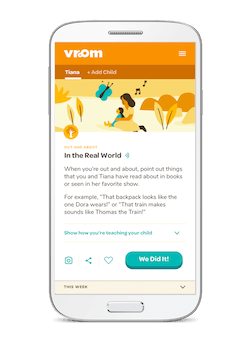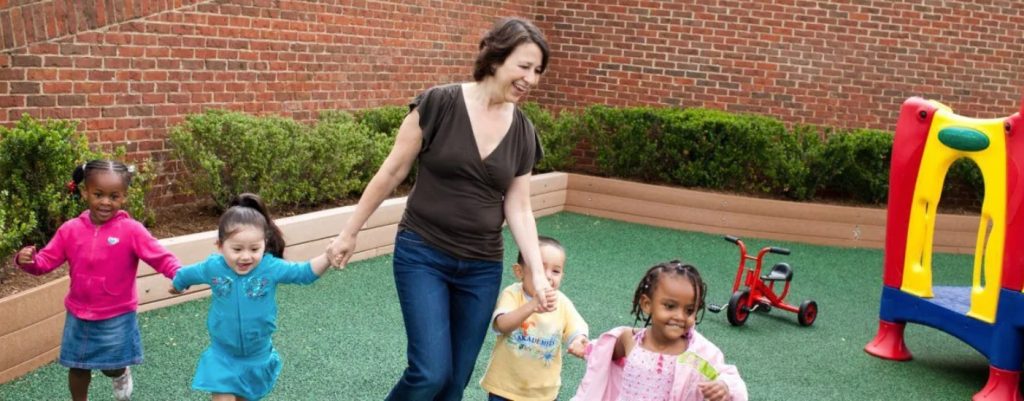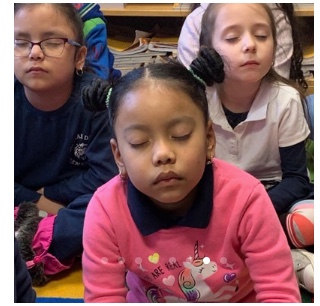Resilience: Encouraging Your Child to be Curious, Flexible,
Creative, and Confident
Vroom, vroom vroom… simple and fun ways to boost brain building at home together with your child. Even a few minutes count.

The Vroom app makes it as simple as having your 6-month-old turn off the lights when you leave a room and turn them on when you enter. Or telling your 1-year-old the daily weather report and how you dressed for it. Maybe your 5-year-old should be in charge of the list when you both run errands. And you and your 3-year-old can empty your pockets every night and you can say where each item came from. These and many more confidence-building activities on the Vroom website.
Take advantage of “everyday moments” with your child

You think you’ve seen it all with your children? Ask an early childhood educator. That’s just what Zero to Three, a nonprofit focusing on child development did. And it found that everyday moments are rich opportunities to encourage healthy development.
Some ideas:
A special goodbye routine. Give your child a kiss on the palm to “hold” all day long. Or, sing a special song together before you leave.
Get your hands dirty. Sensory play gives children tools to enjoy all the adventures the world offers. Whether it’s water, mud or paint – early childhood educators encourage learning through exploration.
Be there during the most challenging moments. Part of early childhood educators’ job is to help young children navigate the tide of strong emotions they experience. This is no small task! But they take the time to understand the meaning behind challenging behavior and help children learn how to cope with strong feelings.
Smiles light up the room. It’s scientifically proven that when babies make an authentic smile, the left frontal part of their brains is activated — the same part of the brain that is activated when adults experience happiness. Early childhood educators spend their days smiling and engaging with children in their care. They know that emotionally-nourishing connections lay the foundation for lifelong health and well-being.
Just a tiny sample of what you’ll find on the Zero to Three website. Enjoy!
There is nothing quite as exhausting as a group of toddlers, but there is also nothing quite as satisfying as helping those early synapses form. It’s a chance to play a role in the most critical years of a child’s life.
JOHN KINSEL, MS, LPCC-S
CDC updates child development milestones!
Skills such as taking a first step, smiling for the first time, and waving “bye bye” are called developmental milestones. Children reach milestones in how they play, learn, speak, act, and move.
The Centers for Disease Control and Prevention (don’t let the name scare you) has updated its comprehensive list of childhood milestones and parent tips. It’s also added two new age groups, 15 and 30 months.
At the CDC site, you can download CDC’s free Milestone Tracker App, watch videos, or simply click on your child’s age for a wealth of the latest information. Available in multiple languages.
Mindfulness during the school day?

Educators in Rhode Island (and around the country) are recognizing the importance of social and emotional awareness in the school setting. According to Inspiring Minds RI, its ResilientKids™ initiative has worked with more than 10,000 Rhode Island students at over 50 different schools across the state since 2012.
“Our results speak for themselves: dramatic reductions in student and teacher stress; bullying; and behavior-related visits to the principal’s office.” The year-long curriculum is designed to help students and their teachers build self-awareness, executive functioning skills, balance, focus, and empathy from the inside out. “Each student has a way to return to center – a safe, happy, and confident place from which they can reset and start again.”
Inspiring Minds hopes to “develop a community of resilient kids who are learning how to pay attention, noticing what’s happening in their bodies, and skillfully responding (rather than reacting) to various stimuli throughout their day.”
It’s like I was in my child’s head!

Humanist Global Charity Founder/Director (and frequent writer on education and brain development) Hank Pellissier uses neuroscience to offer a helpful – and amusing – look into your child’s thoughts and actions, from pre-schoolers to tweeners. On Great!Schools.org.
Washington County Coalition for Children
functioning under the fiscal sponsorship of
Wood River Health
823 Main Street
Hope Valley, RI 02832
wccc@washcokids.org


